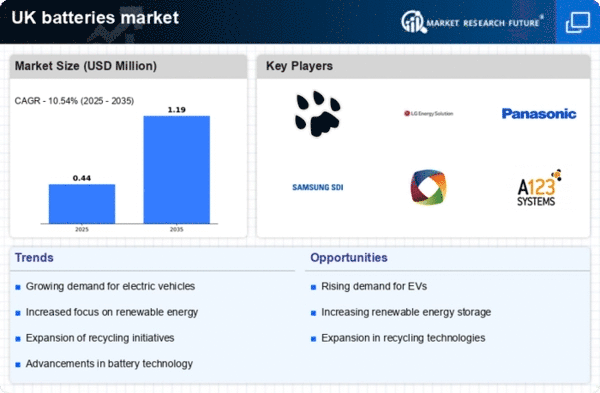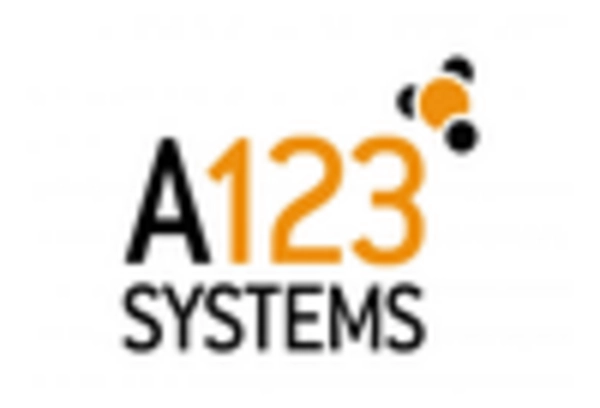Growth in Renewable Energy Storage
The expansion of renewable energy sources, such as solar and wind, is significantly impacting the batteries market in the UK. As the government aims to achieve net-zero emissions by 2050, the need for efficient energy storage solutions becomes paramount. Batteries play a crucial role in storing excess energy generated during peak production times for later use. In 2025, the UK is projected to have over 10 GW of battery storage capacity installed, reflecting a growing trend towards integrating batteries with renewable energy systems. This development not only enhances grid stability but also promotes the use of clean energy, thereby driving demand for advanced battery technologies. The batteries market is thus experiencing a transformation, as energy storage solutions become increasingly vital for the successful implementation of renewable energy initiatives.
Rising Demand for Electric Vehicles
The increasing adoption of electric vehicles (EVs) in the UK is a primary driver for the batteries market. As consumers become more environmentally conscious, the shift towards EVs is accelerating. In 2025, it is estimated that EV sales will account for over 30% of total vehicle sales in the UK. This surge in demand necessitates a robust supply of high-performance batteries, which are essential for the functionality and efficiency of EVs. Consequently, manufacturers are investing heavily in battery technology to enhance energy density and reduce charging times. The batteries market is thus poised for significant growth, driven by the automotive sector's transition to electric mobility. This trend not only supports the automotive industry but also stimulates advancements in battery technology, creating a symbiotic relationship that propels the batteries market forward.
Government Incentives for Battery Development
Government incentives play a pivotal role in shaping the batteries market in the UK. The UK government has introduced various initiatives aimed at promoting battery research, development, and deployment. These incentives include grants, tax breaks, and funding for innovative projects that focus on battery technology. In 2025, it is anticipated that government funding for battery-related initiatives will reach approximately £500 million, underscoring the commitment to fostering a competitive and sustainable batteries market. Such support not only encourages private sector investment but also facilitates collaboration between academia and industry, driving advancements in battery technology. As a result, the batteries market is likely to experience accelerated growth, bolstered by a conducive policy environment that prioritizes innovation and sustainability.
Increased Investment in Battery Manufacturing
The batteries market in the UK is witnessing a surge in investment aimed at boosting domestic manufacturing capabilities. With the growing demand for batteries, particularly for electric vehicles and renewable energy storage, companies are recognizing the need to establish local production facilities. In 2025, investments in battery manufacturing are projected to exceed £1 billion, reflecting a commitment to reducing reliance on imports and enhancing supply chain resilience. This influx of capital is expected to create jobs and foster innovation within the sector. Furthermore, local manufacturing can lead to shorter lead times and improved sustainability practices, as companies seek to minimize their carbon footprints. The batteries market is thus positioned for robust growth, driven by strategic investments that enhance production capabilities and support the transition to a greener economy.
Technological Innovations in Battery Chemistry
Innovations in battery chemistry are reshaping the batteries market in the UK. Research and development efforts are focused on improving battery performance, longevity, and safety. For instance, advancements in lithium-sulfur and solid-state batteries are gaining traction, offering higher energy densities and reduced risks of thermal runaway. These innovations are expected to enhance the overall efficiency of batteries, making them more appealing for various applications, including consumer electronics and electric vehicles. The UK government is also supporting these technological advancements through funding and research initiatives, which further stimulates growth in the batteries market. As these new technologies emerge, they are likely to redefine consumer expectations and drive competition among manufacturers, ultimately benefiting the market as a whole.
















